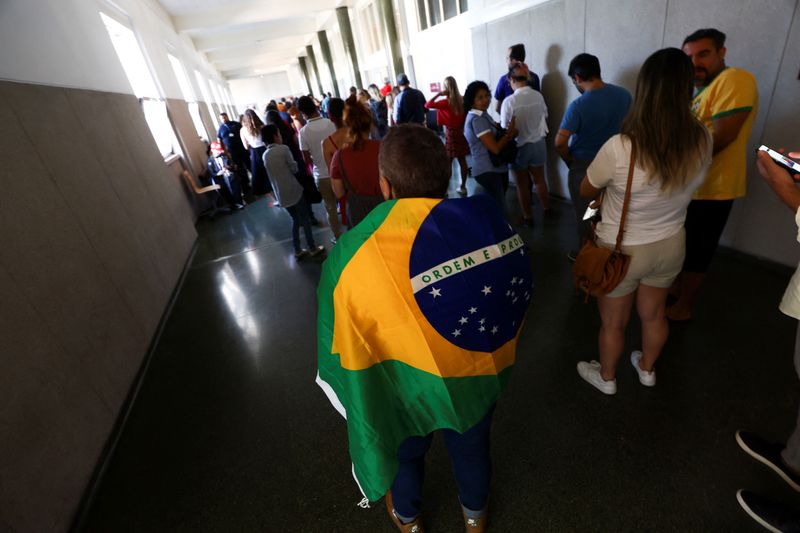By Catarina Demony and Miguel Pereira
LISBON (Reuters) - Brazilian Artur Dantas moved to Portugal six months ago because of political tension in his country but he hopes the result of Sunday's elections might allow him and others to return home one day.
Dantas and thousands of others in Portugal's capital Lisbon, the city with the largest number of Brazilian voters outside the South American nation, queued - some for hours - to cast their ballots in the first round of Brazil's most polarised election in decades.
Nearly 81,000 Brazilians in Portugal are registered to vote, with more than half heading to the polls in Lisbon. Long queues were also reported in other European cities, including London and Paris.
High voter turnout led Brazilian authorities to keep the Lisbon polling station opened until 8 p.m. instead of 5 p.m. as initially planned.
Most opinion polls in the contest for president have shown leftist former leader Luiz Inacio Lula da Silva with a solid lead over right-wing incumbent Jair Bolsonaro. But Bolsonaro has signalled he may refuse to accept defeat, stoking fears of institutional crisis or post-election violence.
"I came (to Portugal) precisely because of the political tension ... I believe Lula will pacify the nation and many Brazilians might be able to go back," said Dantas, a 23-year-old waiter.
The queue to vote in Lisbon snaked around the city's law university, and voters seemed deeply divided. There were some confrontations and exchanges of accusations between supporters from both sides.
The Portuguese police has mobilised officers to prevent violence at polling stations.
Some voters wore t-shirts with Lula's name and face on it while others wore Brazil's yellow and green football jersey, which has become a symbol of those backing Bolsonaro.
But outside the university's entrance, Jacilene Maceao, a 53-year-old cleaner who has lived in Portugal for nearly two decades, wore the jersey as a way to reclaim it. She wants Lula to win.
"Bolsonaro has done nothing for Brazil," she said. "He pretends to be evangelic but he's not evangelic ... he's the devil's son."
As Maceao and others shouted "Lula", some shouted back: "Thief!". Lula, who was president from 2003 to 2010, served a conviction for graft that was later overturned.

Claudio Alves, 28, who wore a crucifix necklace, said Bolsonaro could get Brazil "out of the hole it is in".
"Brazil is a very rich country and has great potential but because of PT (Lula's party) and many years of stealing and corruption Brazil is in the state it is in," he said as his young son stood next to him. "I want a better Brazil."